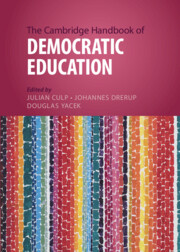Book contents
- The Cambridge Handbook of Democratic Education
- Cambridge Handbooks in Education
- The Cambridge Handbook of Democratic Education
- Copyright page
- Contents
- Contributors
- Acknowledgments
- Introduction
- Part One Historical Perspectives
- Part Two Philosophical and Normative Foundations
- 9 Normative Case Studies as Democratic Education
- 10 Moral Education and Democratic Education
- 11 Rawlsian Political Liberalism and Democratic Education
- 12 Social Justice Education and Democratic Legitimacy
- 13 Critical Theory, Local Moral Perception, and Democratic Education
- 14 Democratic Deliberation in the Absence of Integration
- 15 Education and Democratic Citizenship: Capabilities and Quality Education
- Part Three Key Topics and Concepts
- Part Four Challenges
- Index
- References
14 - Democratic Deliberation in the Absence of Integration
from Part Two - Philosophical and Normative Foundations
Published online by Cambridge University Press: 20 April 2023
- The Cambridge Handbook of Democratic Education
- Cambridge Handbooks in Education
- The Cambridge Handbook of Democratic Education
- Copyright page
- Contents
- Contributors
- Acknowledgments
- Introduction
- Part One Historical Perspectives
- Part Two Philosophical and Normative Foundations
- 9 Normative Case Studies as Democratic Education
- 10 Moral Education and Democratic Education
- 11 Rawlsian Political Liberalism and Democratic Education
- 12 Social Justice Education and Democratic Legitimacy
- 13 Critical Theory, Local Moral Perception, and Democratic Education
- 14 Democratic Deliberation in the Absence of Integration
- 15 Education and Democratic Citizenship: Capabilities and Quality Education
- Part Three Key Topics and Concepts
- Part Four Challenges
- Index
- References
Summary
In order for democratic deliberative interactions in educational settings to fruitfully occur, certain favorable conditions must obtain. In this chapter, I chiefly concern myself with one of these putative conditions, namely that of school integration, believed by many liberal scholars to be necessary for consensus-building and legitimate decision-making. I provide a critical assessment of the belief that integration is a necessary facilitative condition for democratic deliberation in the classroom. I demonstrate that liberal versions of democratic deliberation predicated on this condition are puzzlingly inattentive both to the inevitability of segregation, as well as the inequities occasioned by “school integration.” I then move to probe the possibilities for democratic education in the absence of integration. I argue that neither the possibilities for deliberation nor the cultivation of civic virtue turn on an environment being “integrated.” Indeed, some kinds of segregation may be more conducive to fostering both deliberation and civic virtue.
Keywords
- Type
- Chapter
- Information
- The Cambridge Handbook of Democratic Education , pp. 230 - 249Publisher: Cambridge University PressPrint publication year: 2023

